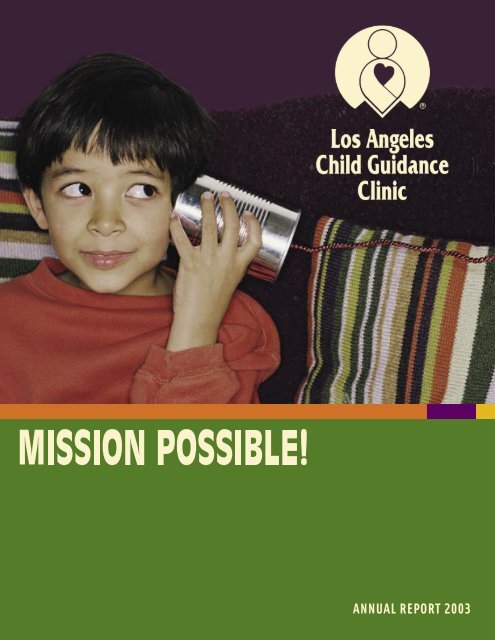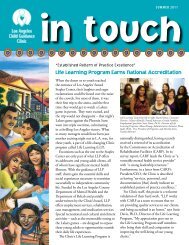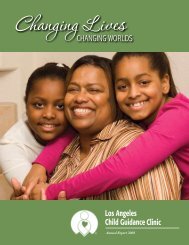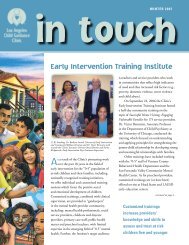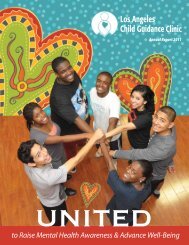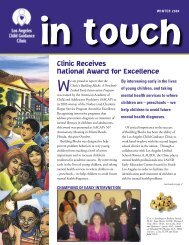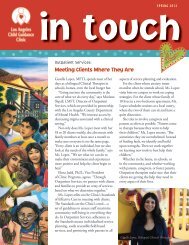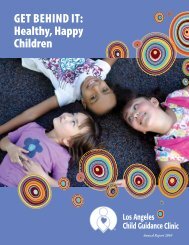ANNUAL REPORT 2003 - Los Angeles Child Guidance Clinic
ANNUAL REPORT 2003 - Los Angeles Child Guidance Clinic
ANNUAL REPORT 2003 - Los Angeles Child Guidance Clinic
You also want an ePaper? Increase the reach of your titles
YUMPU automatically turns print PDFs into web optimized ePapers that Google loves.
<strong>ANNUAL</strong> <strong>REPORT</strong> <strong>2003</strong><br />
MISSION POSSIBLE | 1
Our Mission<br />
The mission of the <strong>Los</strong> <strong>Angeles</strong> <strong>Child</strong> <strong>Guidance</strong> <strong>Clinic</strong> is to provide quality mental<br />
health services to a community in great need by ensuring easy access and promoting<br />
early intervention. The <strong>Clinic</strong> enhances the mental health and well-being of children<br />
and youth ages 0-25 years, and their caregivers, by:<br />
• Providing family-centered, culturally sensitive and clinically sound mental<br />
health programs in an atmosphere that fosters emotional and social growth.<br />
• Providing specialized educational services to seriously emotionally disturbed<br />
children and youth who have failed in other settings.<br />
• Advocating on behalf of children and their families in order to secure needed<br />
services.<br />
• Training mental health professionals and promoting innovative new approaches.<br />
• Promoting strategic collaborative efforts with schools, preschools and other<br />
human services and advocacy agencies in Central and South <strong>Los</strong> <strong>Angeles</strong>.<br />
• Providing follow-along services to clients enrolled in <strong>Clinic</strong> services prior to age<br />
21, through their 25th birthday, when indicated.<br />
• Conducting ongoing evaluations of <strong>Clinic</strong> services to ensure effective outcomes;<br />
and conducting research on <strong>Clinic</strong> services and participating in appropriate<br />
research studies conducted by experts in mental health and related fields.<br />
Our Therapeutic Goals<br />
• Help children and youth who are mentally ill, seriously emotionally disturbed,<br />
abused or at risk for mental health problems to function in a healthy manner at<br />
home, in school and in the community, ensuring that services are offered at the<br />
lowest level of care possible.<br />
• Support primary caregivers in their efforts to strengthen and preserve the<br />
integrity of their families.<br />
• Treat adult family members, as appropriate, in support of family-centered<br />
services.<br />
MISSION POSSIBLE | 2
our mission comes to life<br />
Letter from the Chairperson of the Board<br />
and the Executive Director<br />
Dear <strong>Clinic</strong> Friends and Supporters:<br />
In this Annual Report <strong>2003</strong>, you will see our mission statement come to life in stories of best practices and<br />
successes that illustrate key <strong>Clinic</strong> components, from family-centered programs and strategic collaborative<br />
efforts to ongoing evaluations.<br />
Ensuring easy access and promoting early intervention are at the very core of our mission. But our scope of<br />
therapeutic services and outreach activities go beyond these hallmarks. As this report unfolds, we highlight<br />
for you the comprehensive mental health services, programs and activities of the <strong>Los</strong> <strong>Angeles</strong> <strong>Child</strong> <strong>Guidance</strong><br />
<strong>Clinic</strong>. These are efforts conducted each and every day by a dedicated staff who fulfill our vision of bringing<br />
essential services to children and families in serious need.<br />
A significant commitment that the <strong>Clinic</strong> completed this past year was building a new <strong>Child</strong> and Youth<br />
Development Center. The project’s primary goal was to increase access to much needed mental health services<br />
by children and families residing in Central and South <strong>Los</strong> <strong>Angeles</strong>. This was achieved in two important<br />
ways: by moving our administrative offices out of the Exposition Park facility (and into the new site), thereby<br />
increasing our service capacity at the old site by adding treatment space for our Walk-In <strong>Clinic</strong> and Outpatient<br />
Services; and by further expanding the <strong>Clinic</strong>’s specialty services in the new 30,000 square foot building.<br />
Our new <strong>Child</strong> and Youth Development Center makes access to mental health services easy and convenient,<br />
allowing more children to receive the critical services they need to assist them in becoming healthier and more<br />
successful in their social, home and school environments.<br />
Thank you very much for your friendship and support of the <strong>Los</strong> <strong>Angeles</strong> <strong>Child</strong> <strong>Guidance</strong> <strong>Clinic</strong>, and of the<br />
children we serve, which make the achievement of our mission possible!<br />
Stephen D. Royer<br />
Chairperson of the Board<br />
Elizabeth W. Pfromm, M.S., MPA<br />
Executive Director<br />
MISSION POSSIBLE | 3
ENSURING<br />
EASY ACCESS<br />
New <strong>Child</strong> and Youth<br />
Development Center<br />
After 16 months of construction, and a two-and-a-half year capital campaign that raised over $6.5 million, in<br />
November 2002 the <strong>Clinic</strong>’s new <strong>Child</strong> and Youth Development Center at 3031 South Vermont Avenue opened<br />
its doors to clients. The new facility greatly increased our capacity to provide mental health services and<br />
improve access to meet the growing community need in Central and South <strong>Los</strong> <strong>Angeles</strong>.<br />
The building facilitated the expansion of our Life Learning Program, a program that enables access by offering<br />
comprehensive services to 15-25 year old youth with serious emotional problems who are facing the transition to the<br />
adult world of work and independent living. Also housed in the new facility, The Jack H. Skirball Center for Early<br />
<strong>Child</strong>hood Development brings together the <strong>Clinic</strong>’s eight early intervention programs for children ages 0-5. These<br />
services also ensure easy access by taking mental health services into the community to where kids are – to preschools<br />
and into homes.<br />
THANK YOU Capital Campaign Donors<br />
Cornerstones ($250,000 and Over)<br />
The Ahmanson Foundation<br />
Burton G. Bettingen (estate)<br />
The California Endowment<br />
The Eisner Foundation, Inc.<br />
W. M. Keck Foundation<br />
<strong>Los</strong> <strong>Angeles</strong> <strong>Child</strong> <strong>Guidance</strong> <strong>Clinic</strong><br />
The Ralph M. Parsons Foundation<br />
The Skirball Foundation<br />
Weingart Foundation<br />
Benefactors ($50,000 - 249,999)<br />
Anonymous<br />
Anonymous<br />
Rolland E. Cooper<br />
The Erteszek Family Foundation<br />
Mrs. Charles Luckman<br />
The Kenneth T. and Eileen L. Norris Foundation<br />
The Walt Disney Company Foundation<br />
Leaders ($25,000 - 49,999)<br />
Anonymous<br />
Bank of America Foundation<br />
Burton G. Bettingen Corporation<br />
Hawthorne Savings<br />
Susan H. and David L. Hirsch, III<br />
John R. Liebman and Bonnie Kohl<br />
Pfaffinger Foundation<br />
Tony Ressler and Jami Gertz<br />
Variety – The <strong>Child</strong>ren’s Charity<br />
of Southern California<br />
Robert Zarnegin<br />
MISSION POSSIBLE | 4<br />
Founders ($15,000 - 24,999)<br />
Sandra Berg<br />
Bice Passavant Foundation<br />
Forest Lawn Foundation<br />
Dr. and Mrs. Quinton C. James<br />
The Louchheim Family<br />
The Edwin W. Pauley Foundation<br />
Mr. and Mrs. Stephen D. Royer<br />
Lon V. Smith Foundation<br />
J.B. and Emily Van Nuys Charities<br />
Gina Wilson and Mike Crabbe<br />
Patrons ($10,000 - 14,999)<br />
Donald Bailey, Sr.<br />
Chapman and Associates<br />
Charitable Foundation<br />
Elizabeth W. Pfromm<br />
Ronald McDonald House Charities<br />
of Southern California<br />
Shamrock Holdings, Inc.<br />
The Robert J. Stransky Foundation<br />
Sweet-Friedlander Family<br />
The Victor Family<br />
Carl E. Wynn Foundation<br />
Sponsors ($5,000 - 9,999)<br />
Bobrick Washroom Equipment, Inc.<br />
Nancy and Bob Brachman<br />
The Joanne Marie and Marcel<br />
George Foundation<br />
Gold Family Foundation<br />
Robin and Tom Moody<br />
Patricia and Michael Stoddard<br />
Edgar H. Twine<br />
Associates ($1,000 - 4,999)<br />
Jackie and Howard Banchik<br />
Bank of America<br />
BP Amoco Foundation<br />
Mrs. Cecil Brown<br />
Elaine Carey<br />
Evis and Rosemary Coda<br />
Martha de la Torre and El Clasificado<br />
Betty Friedlander and Bob Haines<br />
Lark Ellen Lions Charities<br />
Beth S. Meltzer<br />
Sonia Mercado<br />
Wayne and Elaine Moore<br />
Northern Trust Foundation<br />
Northrop Space & Mission Systems ECHO<br />
Chris and Valerie Ryan<br />
Ken Siberz and Janet Stewart<br />
in memory of Bert Siberz<br />
Thomas F. Trott, M.D., Ph.D.<br />
Handprints ($500 - 999)<br />
Mr. and Mrs. Kenneth August<br />
Frank G. Binswanger, III<br />
Mr. and Mrs. Dudley H. Pepp<br />
Mr. and Mrs. Kenneth Ruby<br />
Mr. and Mrs. Dennis Weiss<br />
Mrs. Meredith Willson<br />
in memory of Mrs. Charles Luckman
Serving the Uninsured<br />
In an effort to serve all children, regardless of<br />
ability to pay, the <strong>Los</strong> <strong>Angeles</strong> <strong>Child</strong> <strong>Guidance</strong><br />
<strong>Clinic</strong> is often in the position of providing care to<br />
uninsured families. By not turning away families who<br />
lack insurance, we are addressing one major barrier that<br />
prevents children from accessing needed services.<br />
An example of the kind of community support the<br />
<strong>Clinic</strong> receives for these efforts is a $124,000 grant from<br />
the S. Mark Taper Foundation. We are using these funds<br />
to offer school-based counseling services, including<br />
anger management, to benefit children and families who<br />
would otherwise have a difficult time accessing and<br />
obtaining services.<br />
Many of these children suffer in silence, distracted and<br />
unable to adequately learn in school. By reaching out to<br />
the uninsured, we impact children and families in a way<br />
that not only decreases personal and familial distress,<br />
but also improves functioning and the ability to succeed<br />
in school and in the community.<br />
Approximately<br />
192,800 children<br />
living in the <strong>Clinic</strong>’s<br />
service area do<br />
not have health<br />
insurance.<br />
MISSION POSSIBLE | 5
The <strong>Los</strong> <strong>Angeles</strong> County Mental<br />
Health Commission was pleased<br />
to honor the <strong>Clinic</strong>’s Building<br />
Blocks Program with its 2002<br />
Outstanding Program of the<br />
Year Award. The Commission<br />
believes that providing<br />
early intervention for at-risk<br />
children is a critical element in<br />
ensuring these children’s future<br />
successes, and we applaud the<br />
<strong>Clinic</strong>’s efforts in this arena.<br />
— Ilean Rabens,<br />
Chair, <strong>Los</strong> <strong>Angeles</strong> County<br />
Mental Health Commission<br />
MISSION POSSIBLE | 6
PROMOTING EARLY INTERVENTION<br />
First Steps Infant/Toddler<br />
Home Visitation Program<br />
Beginning at birth through<br />
the age of 36 months,<br />
factors such as poverty,<br />
low maternal education,<br />
community violence, abuse or<br />
neglect, separation from parents<br />
and prenatal drug exposure<br />
can impede successful child<br />
development. Infants exposed to<br />
these factors are at risk for later<br />
mental health problems, which<br />
can hamper school performance<br />
and future life successes.<br />
The focus of the First Steps<br />
program is to enhance parentchild<br />
attachment relationships.<br />
Through healthy attachments,<br />
an infant’s social/emotional<br />
knowledge is expanded, brain<br />
functioning is stimulated and<br />
cognitive growth is enhanced,<br />
thereby reducing mental health<br />
risks.<br />
A treatment team composed<br />
of a therapist and a home<br />
interventionist works with<br />
families of at-risk infants in<br />
their homes to train parents in<br />
skills that facilitate attachment,<br />
such as learning how to read<br />
their infants’ emotional cues<br />
and responding appropriately.<br />
A generous grant from the<br />
Dwight Stuart Youth Foundation<br />
supported the pilot year of the<br />
First Steps program.<br />
While our young clients have<br />
been exposed to risk factors that<br />
we cannot change, through First<br />
Steps we can improve children’s<br />
relationships to their parents,<br />
helping to protect them against<br />
future mental health problems.<br />
The focus of<br />
the First Steps<br />
program is to<br />
enhance parentchild<br />
attachment<br />
relationships.<br />
MISSION POSSIBLE | 7
FAMILY-CENTERED PROGRAMS<br />
System of Care<br />
The <strong>Los</strong> <strong>Angeles</strong> <strong>Child</strong><br />
<strong>Guidance</strong> <strong>Clinic</strong> is a<br />
participating agency in<br />
the county-based System of Care<br />
program. This interagency program<br />
coordinates services for seriously<br />
emotionally disturbed children<br />
involved in multiple public service<br />
systems (e.g., the Departments of<br />
Mental Health, <strong>Child</strong>ren and Family<br />
Services and Probation) who are at<br />
risk for placement in a group home<br />
or more restrictive setting.<br />
The <strong>Clinic</strong>’s role in the System of<br />
Care is the delivery of communitybased<br />
and in-home mental health<br />
and case management services. Each<br />
family is assigned a therapist and a<br />
family advocate who help the family<br />
in identifying and working toward<br />
their treatment goals. The treatment<br />
team maintains small caseloads to<br />
ensure their availability to provide<br />
individualized, intensive services.<br />
Each family actively participates in<br />
the program and becomes a member<br />
the System of Care treatment team.<br />
In support of family-centered<br />
programming, the System of Care<br />
embraces:<br />
• FAMILY AND CHILD STRENGTHS<br />
• PARENTS AS PARTNERS AND PART<br />
OF THE SOLUTION<br />
• IN-HOME, COMMUNITY-BASED SERVICES<br />
• PARENT ADVOCACY AND SUPPORT<br />
• FLEXIBLE SERVICES TAILORED TO THE<br />
NEEDS OF EACH FAMILY<br />
Parent Night<br />
The "Parent Night" component of our After-School Day<br />
Treatment program provides quality time to engage in<br />
fun activities that facilitate positive interactions between<br />
children and their caregivers.<br />
The first half of "Parent Night" is dedicated to a parent-child<br />
activity, such as playing board games or creating art projects<br />
together. The second half of the evening involves the parents<br />
in a support group run by therapists, which provides help and<br />
encouragement from the treatment team, as well as from other<br />
caregivers.<br />
In this setting, caregivers whose children have been in the<br />
program for a longer period are often able to gain perspective<br />
on how far their children have come during their treatment.<br />
They realize their progress when they can say to newer parents<br />
“my child used to do that, too.”<br />
With the caregiver’s active involvement in the treatment of their<br />
child, there is a better chance that the child’s accomplishments<br />
in the program will be maintained in the home and school<br />
environments.<br />
MISSION POSSIBLE | 8
SPECIALIZED EDUCATION SERVICES<br />
Burton Green School<br />
The <strong>Clinic</strong>’s Burton Green School is often a last resort for<br />
youngsters whose mental health issues stand in the way<br />
of their academic success. A nonpublic school contractor<br />
with <strong>Los</strong> <strong>Angeles</strong> Unified School District (LAUSD) serving grades<br />
1-12, our School provides an environment conducive to learning<br />
by addressing each student’s unique social, emotional and<br />
educational needs.<br />
The Burton Green School was recently evaluated on both program<br />
quality and education compliance by the California Department<br />
of Education and LAUSD, earning perfect scores on both site<br />
certifications. These independent reviews demonstrate our success<br />
in helping students with Severe Emotional Disturbance (SED) —<br />
who often have accompanying learning disabilities and a history<br />
of school failure — to graduate or experience other achievements<br />
in life.<br />
The educational journey<br />
includes academic<br />
remediation or<br />
enrichment, therapeutic<br />
interventions and<br />
transition skills focused on<br />
supporting a youngster’s<br />
progress from school into<br />
the greater community.<br />
Based on academic and behavioral assessments, each student<br />
at the Burton Green School has an individualized learning and<br />
treatment plan. Guided by teachers and therapists working in<br />
tandem, the educational journey includes academic remediation<br />
or enrichment, therapeutic interventions and transition skills to<br />
support progress from school into the greater community.<br />
Last spring semester we supported four students dually enrolled<br />
in the Burton Green School and in public school – the first step<br />
in the process of returning successful students to mainstream<br />
schools. Five Burton Green seniors completed all the same<br />
graduation requirements as public high school students.<br />
MISSION POSSIBLE | 9
In keeping with the <strong>Clinic</strong>’s<br />
TRAINING<br />
MENTAL HEALTH<br />
PROFESSIONALS<br />
reputation as a leader and innovator<br />
in the children’s mental health arena,<br />
we are committed to educating mental<br />
health professionals and other service<br />
providers to promote the replication of<br />
best practices and model programs. Over<br />
the past year, executive and clinical staff<br />
members have made presentations at the<br />
national, state and local levels, including:<br />
• “Evidence-Based Practices,”<br />
National Mental Health Association<br />
and Mental Health Association in<br />
California.<br />
• “Applying System of Care Values<br />
to Early Intervention Services,”<br />
California Mental Health Advocates<br />
for <strong>Child</strong>ren and Youth.<br />
• “Embracing <strong>Child</strong>ren and Families<br />
in Troubled Times,” Neurons to<br />
Neighborhoods Conference (the<br />
<strong>Clinic</strong> was a co-sponsor of this<br />
conference on trauma).<br />
ADVOCATING ON BEHALF<br />
OF CHILDREN AND FAMILIES<br />
The <strong>Clinic</strong>’s commitment to advocating on behalf of children<br />
and their families to secure needed services is carried out<br />
on many fronts. One might say the “little a” of advocacy<br />
occurs in our daily interactions with clients. Consider the role of<br />
the family advocate who assesses the immediate needs of families,<br />
often in crisis, who come to our Walk-In <strong>Clinic</strong> for assistance.<br />
Family advocates connect families with needed resources,<br />
including access to <strong>Clinic</strong> mental health services, referrals to<br />
homeless and domestic violence shelters and MediCal/Healthy<br />
Families enrollment.<br />
The “Big A” of advocacy is represented by the <strong>Clinic</strong>’s role in the<br />
larger community. The <strong>Clinic</strong> promotes public policy to improve<br />
the quality, availability and funding of needed services. Last<br />
November for example, Executive Director Elizabeth Pfromm<br />
presented to the President’s New Freedom Commission on Mental<br />
Health ways to address positive social and emotional development<br />
within federal initiatives for preschoolers such as Head Start.<br />
MISSION POSSIBLE | 10
TRANSITION SERVICES<br />
Life Learning Program<br />
The <strong>Clinic</strong> recognizes that the need for services and supports does not<br />
necessarily end simply because one graduates from high school or reaches<br />
his or her 21st birthday. In fact, the transition period of leaving the safety<br />
net of children’s services and confronting the independence of the adult world can<br />
be a particularly challenging time for youth with mental illness.<br />
The <strong>Clinic</strong>’s nationally accredited Life Learning Program is designed to support<br />
older adolescents and young adults who are receiving mental health services.<br />
This includes assisting them in pursuing higher educational goals or in identifying<br />
and securing employment opportunities. Hands-on experience and one-on-one<br />
counseling are provided in the areas of vocational assessment, employment<br />
seeking, job development and independent living skills.<br />
The <strong>Clinic</strong> was awarded a grant of $120,000 over three years from The California<br />
Wellness Foundation* in order to expand program services to the 22-25 year<br />
old population of mental health consumers. There are no other mental health<br />
providers in our geographic area that provide these specialized services for young<br />
adults who are attempting to successfully transition to greater independence and<br />
productivity at work and in the world.<br />
Hands-on<br />
experience<br />
and one-onone<br />
counseling<br />
are provided<br />
in the areas<br />
of vocational<br />
assessment,<br />
employment<br />
seeking, job<br />
development<br />
and independent<br />
*The Life Learning Program is funded in part by a grant from The California Wellness Foundation (TCWF).<br />
Created in 1992 as an independent, private foundation, TCWF's mission is to improve the health of the people<br />
of California by making grants for health promotion, wellness education and disease prevention programs.<br />
living skills.<br />
MISSION POSSIBLE | 11
STRATEGIC COLLABORATIVE EFFORTS<br />
Early Intervention<br />
Collaborations<br />
To reach underserved<br />
populations, increase access<br />
and reduce the stigma<br />
associated with seeking services, the<br />
<strong>Los</strong> <strong>Angeles</strong> <strong>Child</strong> <strong>Guidance</strong> <strong>Clinic</strong><br />
collaborates with other community<br />
organizations. As <strong>Clinic</strong> professionals<br />
work in collaborative endeavors<br />
– namely with <strong>Los</strong> <strong>Angeles</strong> Unified<br />
School District (LAUSD) Early<br />
Education Centers and Pacific Asian<br />
Consortium in Employment (PACE)<br />
Head Start Centers – we are able to<br />
reach families who may otherwise<br />
have no contact with mental health<br />
programs. Our innovative models<br />
are designed to promote early<br />
identification and provide intervention<br />
services.<br />
Building Blocks and Stepping Up to<br />
School Readiness are two preschoolbased<br />
early intervention programs<br />
that place therapists and behavioral<br />
interventionists in preschool settings<br />
to intervene early on with at-risk<br />
children, as well as train teachers to<br />
recognize and address emotional and<br />
behavioral problems in the classroom.<br />
By integrating educational and early<br />
intervention services in a community<br />
setting, we improve opportunities<br />
to ameliorate future mental health<br />
problems.<br />
Ongoing Collaborative Activities<br />
Psychiatry Residents Training Program — The <strong>Clinic</strong><br />
has a long-standing affiliation with the University of<br />
Southern California Keck School of Medicine, Division<br />
of <strong>Child</strong> and Adolescent Psychiatry, providing on-site training<br />
for psychiatry residents in the diagnosis and treatment of<br />
children ages five and younger.<br />
<strong>Clinic</strong>al Internship Programs — Academic year-long training<br />
is provided to graduate students in psychology, social work<br />
and marriage and family therapy, in conjunction with local<br />
colleges and universities.<br />
Infant Family Mental Health Initiative — The <strong>Clinic</strong> is<br />
a participating agency in this initiative, a special project<br />
funded by the California Department of Mental Health, in<br />
collaboration with local county departments. Special focus<br />
is placed on identifying children and families with emerging<br />
difficulties and on providing services to these families in a<br />
variety of clinical, community and home settings.<br />
Family Preservation — The <strong>Clinic</strong> works closely with five<br />
lead agencies that have contracts with the County Department<br />
of <strong>Child</strong>ren and Family Service. In these collaborative<br />
partnerships, the <strong>Clinic</strong> provides mental health services to help<br />
prevent children from going into the foster care system.<br />
The <strong>Clinic</strong> serves as a convener for other agencies<br />
in order to better organize the fragmentation of<br />
children’s services, as well as enhance the delivery of<br />
scarce resources for children and families. As a funder<br />
to the <strong>Clinic</strong> for almost eight years, we are grateful for<br />
the added value the <strong>Clinic</strong> brings to our community.<br />
— Richard Atlas, Founder and Trustee,<br />
The Atlas Family Foundation<br />
MISSION POSSIBLE | 12
MISSION POSSIBLE | 13
CONDUCTING ONGOING EVALUATIONS<br />
Performance Measurement of<br />
Innovative Program Services<br />
Today, funders are<br />
increasingly concerned<br />
that providers be<br />
accountable for the impact<br />
of services by demonstrating<br />
measurable results. Not only to<br />
satisfy funder requirements but<br />
to also ensure quality mental<br />
health services, we collect data<br />
on children's functioning levels<br />
at the start of services, at regular<br />
intervals during service delivery<br />
and at the time of discharge<br />
of children participating, for<br />
example, in our Building<br />
Blocks, First Steps and Early<br />
Intervention Day Treatment<br />
programs.<br />
Performance measurement<br />
allows us to address the<br />
quality of services provided<br />
by examining the effectiveness<br />
of our services. Evaluation<br />
tools used include: Achenbach<br />
<strong>Child</strong> Behavior Checklist and<br />
Achenbach Caregiver-Teacher<br />
Form, both providing measures<br />
of the child’s behavioral<br />
problems, and the Preschool<br />
and Early <strong>Child</strong>hood Functional<br />
Assessment Scale, measuring<br />
the child’s ability to interact<br />
successfully in school and home<br />
settings.<br />
Finally, this method of evaluation<br />
communicates efficacy of<br />
<strong>Clinic</strong> programs to various<br />
stakeholders. In a nutshell, we<br />
are pleased to report that the<br />
results of our innovative early<br />
intervention programs indicate<br />
that children receiving services<br />
show observable and statistically<br />
significant improvements in<br />
behavior and social/emotional<br />
functioning.<br />
MISSION POSSIBLE | 14
Our Service Year <strong>2003</strong> in Review<br />
These figures document the <strong>Los</strong> <strong>Angeles</strong> <strong>Child</strong> <strong>Guidance</strong> <strong>Clinic</strong>’s<br />
service to our community’s children, youth and families through<br />
an array of comprehensive mental health programs and services.<br />
5,977 individual children and family members benefited from<br />
<strong>Clinic</strong> services in the year ended June 30, <strong>2003</strong>.<br />
1,458 children, family members and caregivers received<br />
immediate assistance at the no-appointment, bilingual Walk-In<br />
<strong>Clinic</strong>.<br />
47,623 mental health outpatient visits were provided at three<br />
community-based <strong>Clinic</strong> offices, as well as on-site at local schools<br />
and in client homes.<br />
27,327 days of service were provided through the <strong>Clinic</strong>’s range<br />
of educational and day treatment programs.<br />
1,975 children benefited from early intervention services via<br />
Building Blocks: A Preschool-Based Early Intervention Program.<br />
738 children benefited from early intervention services via the<br />
Stepping Up to School Readiness program.<br />
49 young adults received life skills training, vocational counseling<br />
and job placement services through the Life Learning Program.<br />
18 high-risk families were served by the First Steps Infant/<br />
Toddler Home Visitation pilot program.<br />
6 residents from the University of Southern California Keck<br />
School of Medicine served rotations at the <strong>Clinic</strong> through the <strong>Child</strong><br />
Psychiatry Residents Training Program.<br />
MISSION POSSIBLE | 15
QUALITY MENTAL HEALTH SERVICES<br />
Walk-In <strong>Clinic</strong><br />
We have opened our doors to the<br />
community-at-large through our nofee,<br />
no-appointment Walk-In <strong>Clinic</strong>,<br />
increasing access to a wide range<br />
of services for low-income families.<br />
Families are assured of receiving an<br />
immediate mental health screening<br />
for their children, referrals to social<br />
services and crisis intervention by<br />
clinical therapists if needed.<br />
Early Intervention and<br />
Community Wellness<br />
Division<br />
The <strong>Clinic</strong>, a recognized expert in<br />
early intervention, has in the past 13<br />
years developed model programs<br />
that identify and address the mental<br />
health needs of children ages five<br />
and younger and their families. The<br />
Early Intervention and Community<br />
Wellness Division ensures that<br />
programs for this age group are<br />
fully integrated, child-centered and<br />
family-focused, including outpatient<br />
treatment, day treatment, preschoolbased<br />
services, parenting and<br />
in-home services. The Division was<br />
honored by the <strong>Los</strong> <strong>Angeles</strong> County<br />
Department of Mental Health with<br />
its 2002 Service Innovations Family-<br />
Focused Award.<br />
The <strong>Clinic</strong>’s leadership in carrying out mental health public policy initiatives through the design and<br />
implementation of innovative and outcome-based programs sets a tone, and a standard that is highly<br />
regarded in the field, both locally and nationally. Further, the staff’s commitment, dedication and<br />
expertise allow for the provision of quality care to a tremendously under-resourced community.<br />
— Richard Van Horn, President, Mental Health Association in <strong>Los</strong> <strong>Angeles</strong> County<br />
MISSION POSSIBLE | 16
Outpatient Services<br />
The <strong>Clinic</strong> is the resource for<br />
comprehensive diagnostic,<br />
treatment and crisis intervention<br />
services for children and youth in<br />
Central and South <strong>Los</strong> <strong>Angeles</strong>.<br />
Programs of individual, group<br />
and family therapy, art therapy,<br />
case management and in-home<br />
support help both the child and<br />
the family. To increase access,<br />
services are provided at local<br />
elementary and secondary<br />
schools through our School-Based<br />
Services program, where children<br />
needing help are more readily<br />
identified. Collaboration with the<br />
local school district, the Probation<br />
Department and the Department<br />
of <strong>Child</strong>ren and Family Services<br />
provides integrated, intensive inhome<br />
services through the System<br />
of Care program. Through our<br />
CalWORKS program, we are able<br />
to provide direct service to adult<br />
caregivers in our community who<br />
have mental health problems.<br />
Burton Green School<br />
This integrated special education<br />
and day treatment program for<br />
grades 1-12 blends both learning<br />
and therapy to promote academic,<br />
social and emotional growth.<br />
Our school involves children<br />
and youth in a range of activities<br />
focused on providing enriching<br />
experiences and therapeutic<br />
support to help them succeed in<br />
learning. The Burton Green School<br />
serves mentally ill and seriously<br />
emotionally disturbed children<br />
referred from the public school<br />
system.<br />
After-School Day Treatment<br />
This program provides a <strong>Clinic</strong>-based therapeutic environment<br />
including social, cultural and recreational activities for children ages<br />
6-12 who have significant mental health problems. These children<br />
have multiple difficulties at home, in school and in the community.<br />
A treatment team provides milieu therapy, individual therapy and<br />
group therapy for the children. Parent education and support groups,<br />
family therapy and home visits are provided to strengthen the child/<br />
caregiver relationship.<br />
Life Learning Program<br />
Nationally accredited by The Rehabilitation Accreditation<br />
Commission, the Life Learning Program provides support for youth<br />
ages 15-25 with mental health disabilities who will be transitioning to<br />
the adult world of higher education, employment and independent<br />
living. The program provides opportunities for self-sufficiency by<br />
developing the range of vocational and social skills needed to set and<br />
achieve goals. Program staff also provide career and job counseling<br />
and concrete assistance suited to the needs of the individual consumer<br />
and his or her family.<br />
Community Need for Services<br />
Total Youth Population 356,535 344,660<br />
<strong>Child</strong>ren Below Poverty Level 46% 41%<br />
<strong>Child</strong> Abuse Referrals 24,997 16,336<br />
<strong>Child</strong>ren in Out-of-Home Care<br />
Service Planning Area 6<br />
South <strong>Los</strong> <strong>Angeles</strong><br />
DCFS caseload 10,825 5,360<br />
Probation 286 69<br />
High School Graduation Rate 43% 51%<br />
ETHNIC COMPOSITION OF YOUTH POPULATION<br />
Service Planning Area 4<br />
Central <strong>Los</strong> <strong>Angeles</strong><br />
Hispanic/Latino(a) 69% 77%<br />
African American 28% 4%<br />
Asian/Pacific Islander 1% 13%<br />
Caucasian 1% 7%<br />
American Indian 0% 1%<br />
Data from <strong>Child</strong>ren’s Score Card 1995-1999, <strong>Los</strong> <strong>Angeles</strong> <strong>Child</strong>ren’s Planning Council<br />
MISSION POSSIBLE | 17
Celestial Donors<br />
Outright or Cumulative Giving for <strong>Clinic</strong> Program Support<br />
Heartfelt thanks to these good friends, our angels, whose generous and<br />
loving support of our program efforts brings hope and help to children<br />
and their families.<br />
DIAMOND ANGELS —<br />
$50,000 and Over<br />
Anonymous<br />
Anonymous<br />
The Atlas Family Foundation<br />
The Auxiliary of the<br />
<strong>Los</strong> <strong>Angeles</strong> <strong>Child</strong> <strong>Guidance</strong> <strong>Clinic</strong><br />
California Community Foundation<br />
The California Endowment<br />
The California Wellness Foundation<br />
The Hulen C. Callaway Trust<br />
Carrie Estelle Doheny Foundation<br />
Joseph Drown Foundation<br />
First 5/LA – Proposition 10 Commission<br />
Mr. & Mrs. David L. Hirsch<br />
Les Dames de Champagne of <strong>Los</strong> <strong>Angeles</strong><br />
Mr. & Mrs. Mark S. Louchheim<br />
William S. Louchheim<br />
Mr. & Mrs. Kenneth Moelis<br />
The Kenneth T. & Eileen L. Norris Foundation<br />
The Ralph M. Parsons Foundation<br />
Monica G. Petrucci & Robert Zarnegin<br />
The Skirball Foundation<br />
Dwight Stuart Youth Foundation<br />
S. Mark Taper Foundation<br />
UniHealth Foundation<br />
United Way of Greater <strong>Los</strong> <strong>Angeles</strong><br />
The Walt Disney Company Foundation<br />
Weingart Foundation<br />
PLATINUM ANGELS —<br />
$25,000 – 49,999<br />
Anonymous<br />
Nancy & Bob Brachman<br />
Confidence Foundation<br />
Crail-Johnson Foundation<br />
The Everhealth Foundation<br />
Honoring the Memory of Frederick I. Frischling<br />
The Hearst Foundation, Inc.<br />
George C. Page<br />
Shamrock Holdings of California, Inc.<br />
SHARE, Inc.<br />
Lon V. Smith Foundation<br />
J. B. & Emily Van Nuys Charities<br />
The Victor Family<br />
Whitecap Foundation<br />
GOLD ANGELS —<br />
$15,000 – 24,999<br />
Anonymous<br />
The Cleveland Foundation<br />
The Erteszek Foundation<br />
Bernard & Ellyn Gelson<br />
<strong>Los</strong> <strong>Angeles</strong> Times Summer Camp Fund<br />
Ronald McDonald House Charities<br />
Sweet-Friedlander Family<br />
Toyota Motor Sales, U.S.A.<br />
Transamerica Foundation<br />
Carl E. Wynn Foundation<br />
Robert & Joyce Zaitlin<br />
SILVER ANGELS —<br />
$7,500 – 14,999<br />
ARCO Foundation<br />
BankAmerica Foundation<br />
Cactus Classic Golf Tournament<br />
Employees Community Fund<br />
of Boeing California<br />
Diane and Guilford Glazer<br />
Dr. & Mrs. Quinton C. James<br />
KTLA Charities<br />
<strong>Los</strong> <strong>Angeles</strong> Times Family Fund<br />
The Harold McAlister Charitable Foundation<br />
Elizabeth W. Pfromm<br />
Adrienne & Kenneth Pingree<br />
Mr. & Mrs. Stephen D. Royer<br />
Dr. Ruth Sinay & Mr. Joseph Sinay<br />
Sidney Stern Memorial Trust<br />
Robert J. Stransky Foundation<br />
The Times Mirror Foundation<br />
TRW ECHO<br />
Union Bank of California<br />
Virginia M. Wilson<br />
R. S. Zarnegin Continuation Ltd.<br />
BRONZE ANGELS —<br />
$2,500 – 7,499<br />
Anonymous<br />
Anonymous<br />
Mr. & Mrs. Kenneth A. August<br />
The R. C. Baker Foundation<br />
Frank G. Binswanger III<br />
The Brotman Foundation of California<br />
Mrs. Cecil Brown<br />
Rolland & Yoshie Cooper<br />
Tom & Mary DeMund<br />
Jeff & Noelle Donfeld<br />
Mr. & Mrs. Roy Essakow<br />
Betty J. Friedlander & Robert D. Haines<br />
Emerson Glazer<br />
Erika Glazer<br />
Governor’s Book Fund, California<br />
State Library Foundation<br />
Jane Hefflefinger<br />
Hollywood Park Racing Charities, Inc.<br />
The Audrey & Sydney Irmas<br />
Charitable Foundation<br />
Mr. & Mrs. Robert M. Jason<br />
Adriana & Marvin Karno<br />
The Kennedy/Marshall Company<br />
Nancy & Jim Krasne<br />
Marilyn & John Liebman<br />
Marlene & Sandy Louchheim<br />
Mr. & Mrs. Charles Luckman<br />
Robin & Tom Moody<br />
Ilene & Jeff Nathan<br />
Peter Norton Family Foundation<br />
Oak Tree Charitable Foundation<br />
Pfaffinger Foundation<br />
Antony P. Ressler & Jami B. Gertz<br />
The Riordan Foundation<br />
Ken & Wendy Ruby<br />
Brion R. Sasaki<br />
Helen L. Scharps<br />
Brad Scott<br />
Mitchell J. Stein Foundation<br />
Steven & Raeann Talavera<br />
Universal Studios<br />
Richard & Kay Van Horn<br />
Torrey Webb Charitable Trust<br />
Wells Fargo Foundation<br />
Mr. & Mrs. Frank Sanford Whiting<br />
ENDOWMENT ANGELS<br />
The Steve Neuman Special Fund<br />
The Charles A. & Margaret W. Pollak Trusts<br />
Please Note: The honor roll of annual donors to the <strong>Los</strong> <strong>Angeles</strong> <strong>Child</strong> <strong>Guidance</strong> <strong>Clinic</strong> is published<br />
in our agency newsletter In Touch. We are deeply grateful for the support of all our donors.<br />
MISSION POSSIBLE | 18
OUR BOARD OF DIRECTORS<br />
The <strong>Los</strong> <strong>Angeles</strong> <strong>Child</strong> <strong>Guidance</strong> <strong>Clinic</strong> is deeply grateful for the governing<br />
leadership of our Board of Directors. These individuals give generously of<br />
their time, talent and resources in carrying out the <strong>Clinic</strong>’s mission. Their<br />
unfailing commitment to our vision, and to the children in our Central and<br />
South <strong>Los</strong> <strong>Angeles</strong> community, is at the heart of our success.<br />
Robert S. Brachman<br />
Wilshire Insurance Agency<br />
T. Elaine Carey<br />
Control Risks Group, LLC<br />
Martha C. de la Torre<br />
El Clasificado<br />
Eugene Friedlander<br />
Ken Ruby Construction Company<br />
David L. Hirsch<br />
MASCO Corporation<br />
Vice Chairperson<br />
Quinton C. James, M.D.<br />
<strong>Los</strong> <strong>Angeles</strong> Unified School<br />
District, rtd.<br />
Immediate Past Chairperson<br />
John R. Liebman, Esq.<br />
McKenna Long & Aldridge<br />
Mark S. Louchheim<br />
Bobrick Washroom<br />
Equipment, Inc.<br />
Sonia Mercado, Esq.<br />
Sonia Mercado & Associates<br />
Robin L. Moody<br />
Tom Moody, Inc.<br />
Annual Report <strong>2003</strong><br />
Alyson Goodall, Editor<br />
EmJay Creative, Design<br />
Robert J. Neary<br />
TechGnosis, Inc.<br />
Carlos A. Perez<br />
Deloitte & Touche, LLP<br />
Chairperson<br />
Stephen D. Royer<br />
Shamrock Capital Advisors, Inc.<br />
Treasurer<br />
Michael W. Stoddard<br />
Silversword Finance Group, LLC<br />
Cynthia A. Telles, Ph.D.<br />
UCLA School of Medicine<br />
Thomas F. Trott, M.D., Ph.D.<br />
<strong>Child</strong> Psychiatrist in private practice<br />
Secretary<br />
Edgar H. Twine, Esq.<br />
ARCO, rtd.<br />
Samuel M. Victor<br />
Chanin Capital Partners<br />
Virginia M. Wilson<br />
Cendant Corporation<br />
OUR EXECUTIVE STAFF<br />
Executive Director<br />
Elizabeth W. Pfromm, M.S., MPA<br />
Director of Programs<br />
Elena Judd, Ph.D.<br />
Director of Administration and Finance<br />
Steven M. Talavera<br />
Director of Human Resources<br />
and Program Development<br />
Teresa Leingang, M.A., J.D.<br />
Director of Development<br />
Debbi Winter<br />
OUR OFFICES<br />
University Park Office<br />
<strong>Child</strong> and Youth Development Center<br />
and Administrative Offices<br />
3031 South Vermont Avenue<br />
<strong>Los</strong> <strong>Angeles</strong>, CA 90007<br />
(323) 373-2400<br />
Exposition Park Office<br />
The Harriet and Charles Luckman Building<br />
3787 South Vermont Avenue<br />
<strong>Los</strong> <strong>Angeles</strong>, CA 90007<br />
(323) 766-2345<br />
Leimert Park Office<br />
4401 Crenshaw Boulevard, Suite 300<br />
<strong>Los</strong> <strong>Angeles</strong>, CA 90043<br />
(323) 290-8360<br />
Access to voicemail<br />
system for all offices:<br />
(323) 766-2360<br />
MISSION POSSIBLE | 19
Founded in 1924, the <strong>Los</strong> <strong>Angeles</strong> <strong>Child</strong> <strong>Guidance</strong> <strong>Clinic</strong><br />
is a nonprofit, tax-exempt charity that provides<br />
mental health services to at-risk children and their<br />
families in Central and South <strong>Los</strong> <strong>Angeles</strong>. Services are<br />
provided without regard to ability to pay.<br />
3031 South Vermont Avenue<br />
<strong>Los</strong> <strong>Angeles</strong>, CA 90007<br />
(323) 373-2400<br />
www.lacgc.org<br />
MISSION POSSIBLE | 20


